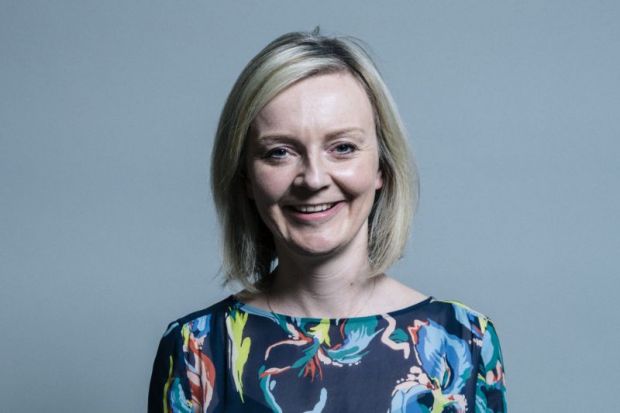Liz Truss has been urged to make education and research a priority after being confirmed as the UK’s next prime minister.
Ms Truss, currently the foreign secretary, beat former chancellor Rishi Sunak in the race to be the new leader of the Conservative Party, securing about 57 per cent of valid votes. She will replace Boris Johnson in No 10 on 6 September.
Despite pitching herself as an “education prime minister” during the course of the campaign, Ms Truss has had little to say about universities and research.
Her major policy intervention in this area concerned admissions to the universities of Oxford and Cambridge, as she pledged to guarantee an interview with the elite institutions for anyone who achieved three A* grades in their A levels, a move that would have required a switch to post-qualification admissions and, potentially, January start dates for undergraduate courses.
This prompted Graham Virgo, pro vice-chancellor for education at the University of Cambridge, to raise concerns about institutional autonomy, while others in the sector urged Ms Truss – herself an Oxford graduate – to think beyond Oxbridge when formulating policies.
Several pressing issues with major repercussions for higher education await Ms Truss as she takes office. The next prime minister has been urged to tackle the ongoing deadlock over the UK’s association to Horizon Europe.
Vice-chancellors have also pushed for the government to reconsider the “deep freeze” of university tuition fees, arguing that the soaring rate of inflation has devalued fees – which have risen just once in the past decade – even further.
Meanwhile, it was thought that the government had been ready to respond to consultations on its plans to introduce student number controls and a minimum entry requirement just before the leadership crisis occurred, but the plans, which the Johnson government had already pledged to implement via a bill, had to be paused. Further significant delays could potentially put in doubt the introduction of student number controls for 2024-25.
Attention will quickly shift to who will be in Ms Truss’ Cabinet. James Cleverly, who became education secretary in the midst of the chaos surrounding Mr Johnson’s departure, is not expected to remain in the post, as he is being tipped to move into Ms Truss’ old department.
Instead, Kemi Badenoch has been tipped to be handed the education brief on the back of her own leadership campaign, which criticised “pointless” degrees. Michelle Donelan, who was briefly education secretary before Mr Cleverly, and also served as higher education minister, is another option.
Business secretary Kwasi Kwarteng has been tipped as a likely chancellor of the Exchequer.
Beth Thompson, associate director of policy at the Wellcome Trust, said the UK “cannot be complacent” about its global pre-eminence in science and research and highlighted urgent global threats such as disease and climate change.
“We urge the prime minister to seize this moment and invest in science and innovation to help solve these issues. To be successful, they will need to be clear on their priorities and provide the long-term funding required to make these a reality – including following through on commitments to increase investment in the UK’s world-leading research and development sector,” Ms Thompson said.
“But also recognise that the UK cannot do it alone. There is a vital need for global collaboration; UK-based scientists and institutions need to collaborate with their counterparts around the world, and the UK needs to be an attractive and exciting place to work. Horizon Europe is a prime example – the new government must secure the closest possible involvement to safeguard research collaboration.
“Securing the UK’s global role in science won’t happen by accident. This work should be overseen by a science minister who can work across government to agree priorities and implement a plan.
“The prime minister must prioritise bold commitments to turn ‘science superpower’ from catchphrase into reality, putting science and innovation at the heart of their agenda. If they do this, they can help everyone live a healthier life.”
Lee Elliot Major, professor of social mobility at the University of Exeter, said that at “the very top of the in tray for the new education secretary” would be helping “to manage the unfolding crisis of escalating costs and increasing hardship now affecting the lives of millions of children and young people”.
Register to continue
Why register?
- Registration is free and only takes a moment
- Once registered, you can read 3 articles a month
- Sign up for our newsletter
Subscribe
Or subscribe for unlimited access to:
- Unlimited access to news, views, insights & reviews
- Digital editions
- Digital access to THE’s university and college rankings analysis
Already registered or a current subscriber? Login








